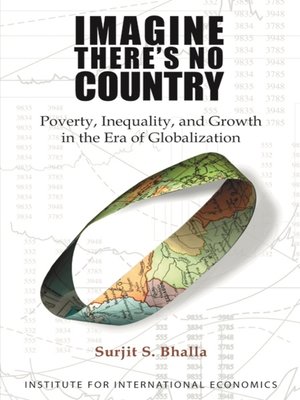Imagine There's No Country
ebook ∣ Poverty, Inequality, and Growth in the Era of Globalization
By Surjit S. Bhalla

Sign up to save your library
With an OverDrive account, you can save your favorite libraries for at-a-glance information about availability. Find out more about OverDrive accounts.
Find this title in Libby, the library reading app by OverDrive.



Search for a digital library with this title
Title found at these libraries:
| Library Name | Distance |
|---|---|
| Loading... |
A new era of globalization, which began in the 1980s, brought about a significant decline in costs of transportation, communication, and production; considerably improved intercountry competitiveness; and broke down trade and cultural barriers among countries. The concept of a sovereign nation has been increasingly questioned in recent years. Some, indeed, have imagined a world without boundaries, without countries. Others who doubt the benefits of globalization have called for increased protectionism and greater regulation of economic activity. Has globalization made the world grow faster? Has poverty declined at a faster pace during globalization? If yes, why? If not, is it because the growth rate was lower, or because inequality worsened, or both? Who gained from globalization? Was it the elite in both the developed and developing world? What about the middle class? Who are they? How did they benefit from (or lose to) the forces of globalization?
This comprehensive study firmly debunks several popular myths such as the belief that globalization has resulted in lower overall growth rates for poor countries, increasing world inequality, and stagnating poverty levels. Through rigorous, integrated methodologies and an enhanced dataset, the author, Surjit Bhalla, answers some of the most pressing policy issues confronting us today.







